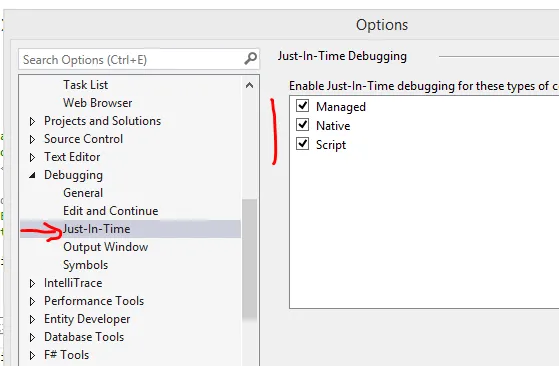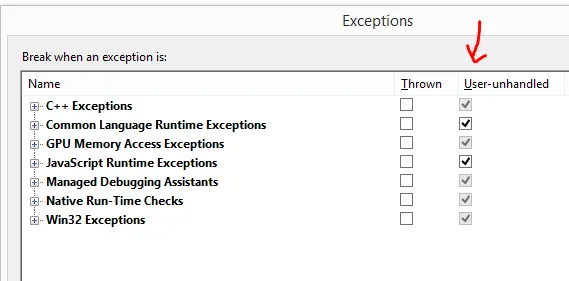使用C#、Visual Studio 2013和Windows Store App
稍微解释一下
创建一个简单的Windows Store App,用于处理存储的JSON数据。在数据量增加后,我开始收到消息Unhandled win32 exception occured in AppName [procId]. - 请参见以下图片:

我尝试减少JSON文件中存储的数据量,但是在调试期间休息了一段时间后,我再次收到此消息。因此,情况是:如果我有很多数据,则可以在应用程序中执行几个操作(几个意味着5)并获得此异常,如果我具有最小数量的数据,则可以使用 应用程序稍微更多(大约12-17种不同操作)。 操作意味着-从文件读取,保存,加载页面等。
我稍微Google了一下,并发现了一些可能的原因:
- 我必须在PC上设置DEP,按照以下步骤进行操作:
- 右键单击“我的电脑”。 然后选择“属性”。
- 选择“高级”选项卡。
- 选择“性能”的“设置”。
- 选择“数据执行保护”选项卡。
- 选择选项“仅为必要的Windows程序和服务打开DEP”。 如果已选择此选项,请单击“确定”,然后再次单击“确定”。
- 重新启动计算机。
尝试-无效
- 检查并启用我的VISUAL STUDIO中的即时调试

尝试-无效
- 检查VS可以捕获哪种类型的异常-选择全部:

尝试-无效
找到以下内容:
An unhandled win32 exception occurred in . Just-In-Time debugging this exception failed with the following error: The logged in user did not have access to debug the crashing application. This message indicates that Just-In-Time debugging failed because you do not have proper access permissions.
因此,意味着您没有适当的访问权限。
尝试使用管理员权限启动我的应用程序:

尝试-无效
- 还阅读了许多来自这里的帖子。
发现这个和这篇MSDN帖子很有用。尝试在我的应用程序中添加一些代码:
public MainPage()
{
this.InitializeComponent();
this.navigationHelper = new NavigationHelper(this);
this.navigationHelper.LoadState += navigationHelper_LoadState;
this.navigationHelper.SaveState += navigationHelper_SaveState;
TimeBinding();
Application.Current.UnhandledException += new UnhandledExceptionEventHandler(MyHandler);
}
static void MyHandler(object sender, UnhandledExceptionEventArgs args)
{
string e = args.Message.ToString();
}
但是没有捕获到任何东西...
所以,尝试 - 没有帮助
问题:
- 我为什么会收到这个消息,除了我没有描述的可能原因外,还有什么其他可能导致类似于“在应用程序名[procId]中发生未处理的win32异常”的异常?
- 我是否正确理解了
UnhandledException的使用?也许我对它的理解是错误的,所以我无法捕获所需的异常(我只是在学习.NET)?